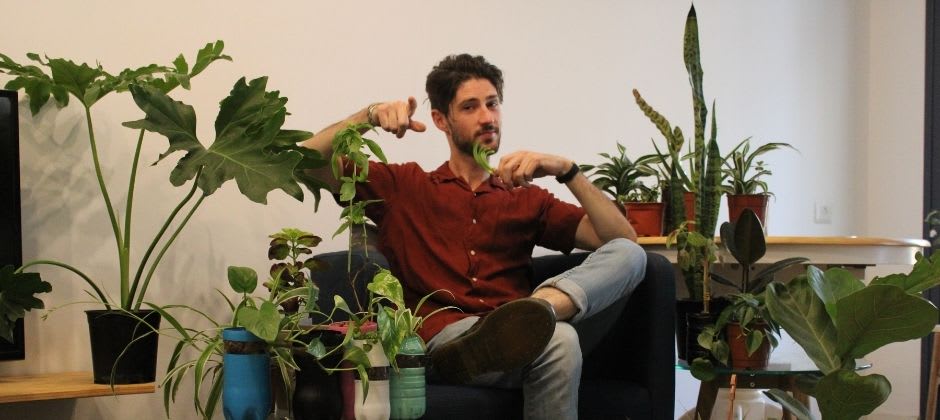Study in Israel: Boost Your Ideas and Create a Better Future
Looking for creativity and inspiration in a study abroad program? Israeli academia welcomes international students to engage with innovation, technology, and entrepreneurship across all programs.
- Career Advice
- Study Abroad in Israel
- Business

Israeli academia welcomes international students to engage with innovation, technology, and entrepreneurship across its academic programs.
Ranked seventh globally by the Bloomberg Innovation Index 2021, Israel has more hi-tech startups per capita than any other country in the world. More so, many groundbreaking developments and leading companies are rooted within Israeli academia. As a student in Israel, you are fortunate to learn with innovative, pioneering minds that push forward the country to the world's leading board for entrepreneurship.
In recent years, Israeli academia has sought to integrate innovative interactions directly into campus life, aiming to advance interdisciplinarity and strengthen academia-industry ties and collaboration. Different initiatives emerging from these collaborations occasionally offer a groundbreaking opportunity for students to channel their creativity into projects with a potential for impact.
Many programs, especially in the STEM and MBA fields, involve their students in current projects and guide them to develop, promote, and implement entrepreneurial ideas. As a student, you get the chance to study in an open academic environment that removes barriers between disciplines as well as between academia and industry. This educational approach offers students the opportunity to excel, gain creative and critical thinking skills, and tackle real-world problems.

Gabriel Godley is an example of a student who thrived in this surrounding. Originally from Johannesburg, South Africa, Godley chose to study Electrical Engineering at Tel Aviv University. While comparing his current studies to his past university experience in South Africa, he says: "TAU (Tel Aviv University) is preparing us for the future, for what's coming."
Israel's innovative, vibrant academic environment stimulated Godley and encouraged him to keep developing his ideas. Godley refers to his overall experience in which TAU helped him gain this mindset, notably by participating in hackathons organized by the university:
"You're given a problem, and you need to go find a solution with a team. No barriers, tell us what you can do. Think outside the box of what's possible".
Coming from South Africa, Godley's personal experience of witnessing homelessness and starvation motivated him to develop sustainable solutions for food insecurity. He mentions TAU as a stimulating space that welcomed and embraced his ideas offering an encouraging environment for development and creation. Godley expresses a sense of "belief" in his capabilities, proving the epitome of the Israeli idea "just go out and do it because you can, and you're worthy"!
Following this notion, Godley recently launched his first startup! And as CEO of "Pots Farms," he defines its activity as:
"Integrating nature and humanity using technology to do it" - The goal is to improve the environmental quality of the world by finding economically innovative solutions to solve significant problems such as plastic pollution and toxic habitats. Currently a convenient online plant store with educational tools and resources, the next stage is developing an artificially intelligent modular hydroponic farming solution in an urban environment. Godley describes this project as one more step to his ultimate goal of removing starvation from the human experience.

Adding to Godley's satisfaction is Jonathan Nyagaka, originally from Kenya. Nyagaka came to Israel to pursue a Bachelor's degree in Civil Engineering at the Technion – Israel Institute of Technology located in Haifa.
Through the rich curricula of the program, Nyagaka was exposed to a broad range of subjects related to civil engineering. This aspect, he says, allowed him to "take a class in Transportation Planning during which I developed a huge interest in the field." Johnathan mentions that "To build on my knowledge in this field, I have been in touch with professors who offered me the opportunity to assist them with projects in the Transportation Planning field." Offering us a glance toward one of these projects, Johnathan says that "As part of the project, I conducted a study on comparing trips by drivers to their experience in a self-driving car. Thus, having the chance to take part in the development of Autonomous driving technology. Being involved in such projects gives me an insight on what is needed in order to come up with solutions to some of the challenges faced by the Transportation industry, and probably create a startup featuring some of these solutions."

Janhavi Pawar from India is in her third year at Reichmann University (formerly IDC Herzliya), double majoring in business and entrepreneurship. She mentions the impact of this surrounding on her academic experience. She points out, "I really like the fact that the professors are 'industry experts' - they've lived the story, they know what they're talking about, and it's not totally academia. Real-life and textbook applications are often vastly different from each other. The professors definitely know their stuff, and have some great experiences and examples to share with us. Every single professor that we reached out to for help for our start-up after class hours were helpful and encouraging".
Bringing up her first career steps, Pawar states, "PwrPARK began as a class project during my first year at Reichman."
The project has since grown into a market-ready product. Its mission is to develop charge and park stations for the e-scooter industry. They help organize spaces from micro-mobility clutter by offering safe parking and 24/7 charging solutions for public scooter owners.
Pawar shares the project's story while revealing the great advantage of combining academic studies and building a startup: "We tried to connect things that we learned to our start-up - we asked our professors to review our pitch decks, to connect us with mentors, digital marketing, and so on".
Pawar emphasizes that working on the startup with fellow students "made understanding our school curriculum easier too, as we would apply what we learned to our startup." Pawar's experience is an excellent example of universities' initiatives designed to accompany and push students forward, reinforcing the chance of their startup getting to the next stage!
These exciting experiences are just a few examples reflecting the entrepreneurial and innovative academic environment, which encourages students to shape their careers.
Israel's universities welcome students looking to push their limits, free their minds, and thrive in this exceptional hub of innovation and entrepreneurship!
About the Author

The 'Study in Israel' team is part of the Council for Higher Education (CHE) and the Planning and Budgeting Committee of Israel (PBC), the national institution responsible for higher education matters. For more information on the CHE and PBC, please refer to CHE's website www.che.org.il. For all inquiries relating to studying in Israel, please contact us at studyisrael@che.org.il.

Author
The Keystone Team is comprised of experienced educators and advisors dedicated to providing valuable resources and advice to students all over the world.
Read related articles

Top 5 Master's Degrees to Boost Your Business Career

Top 10 Popular Online MBAs
